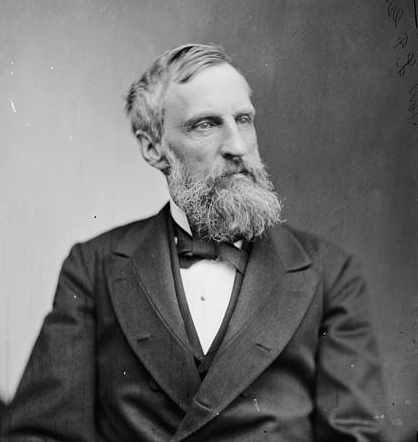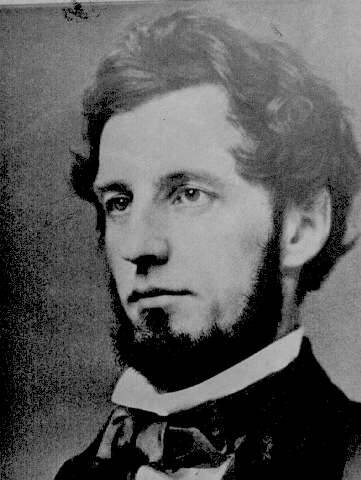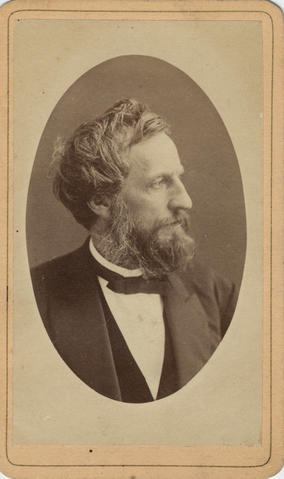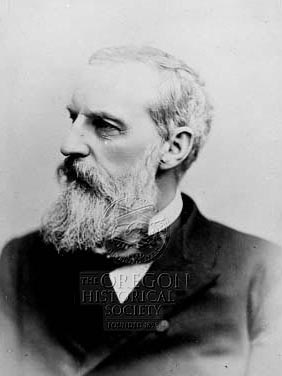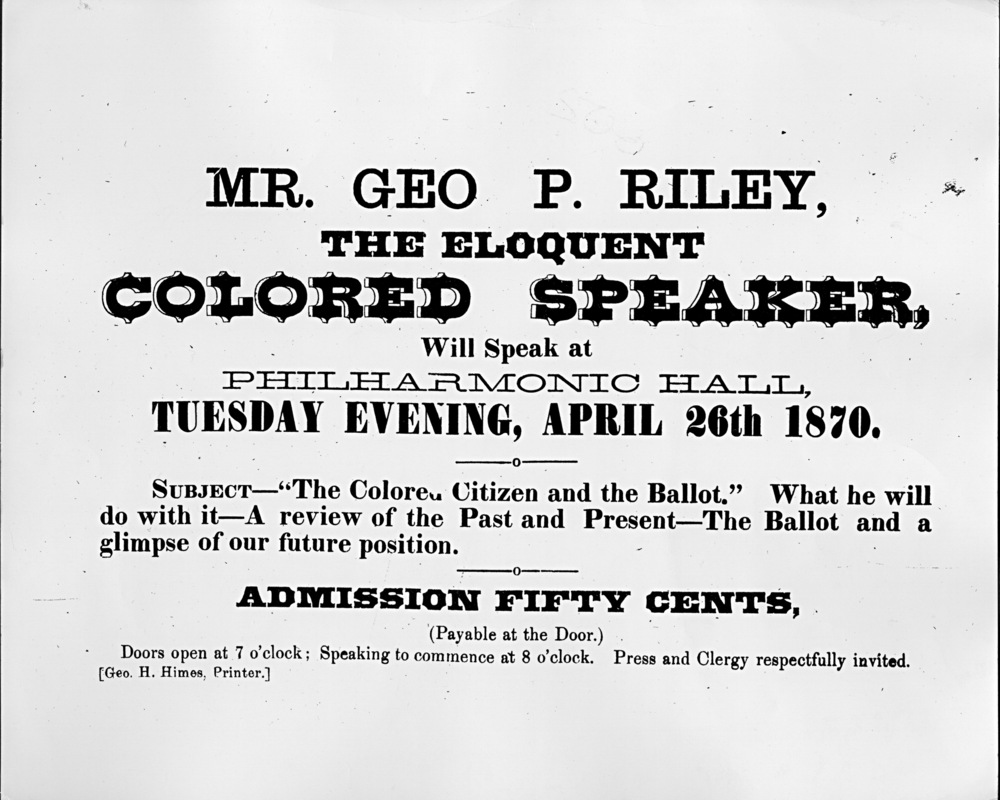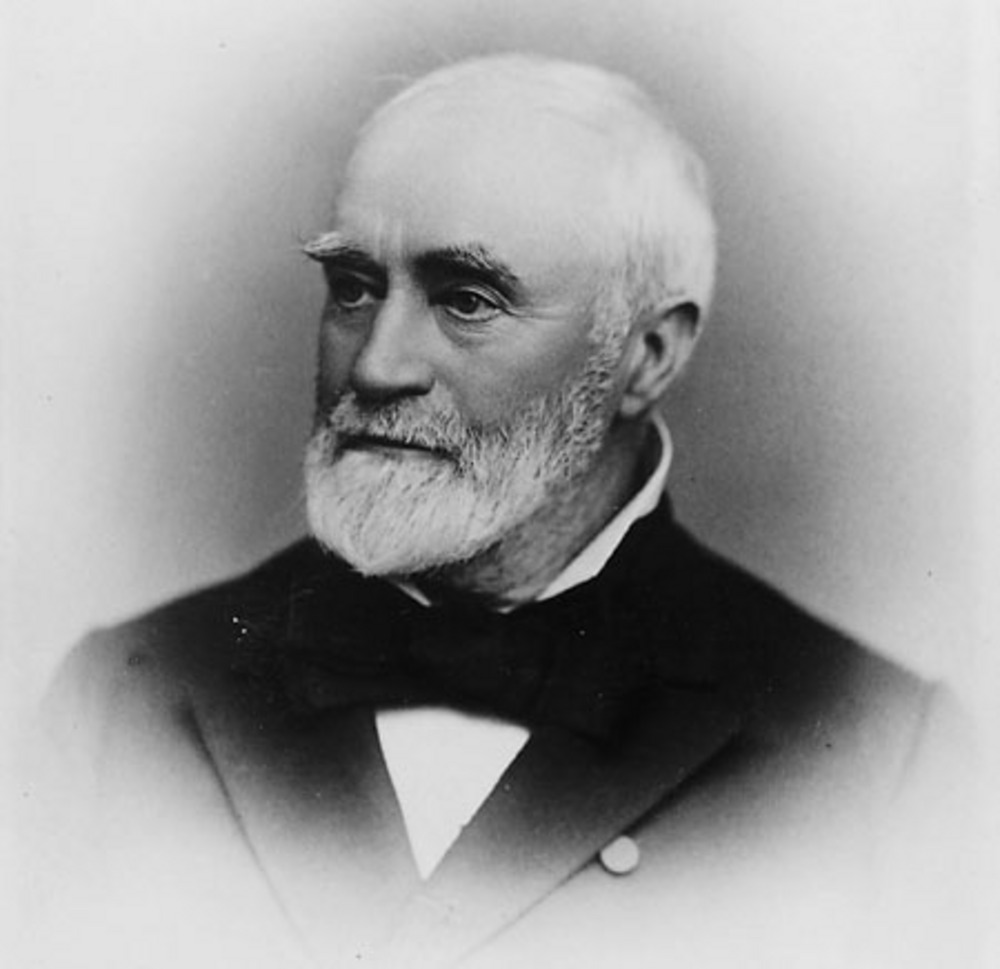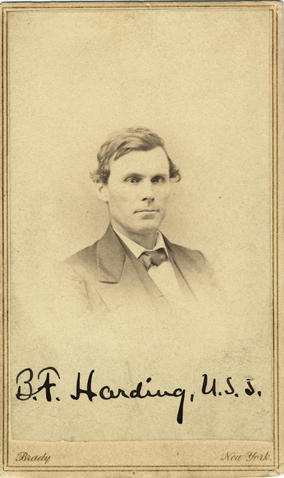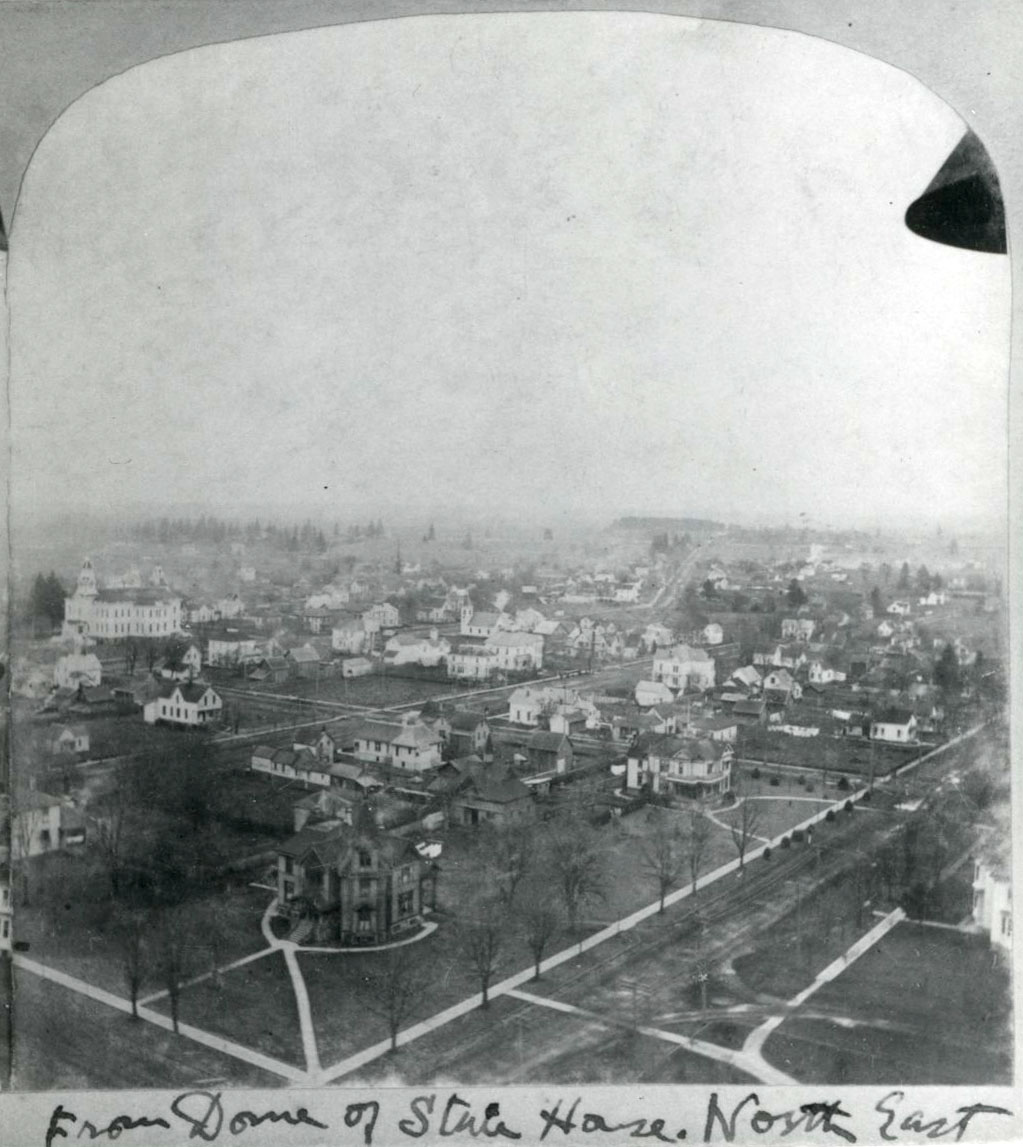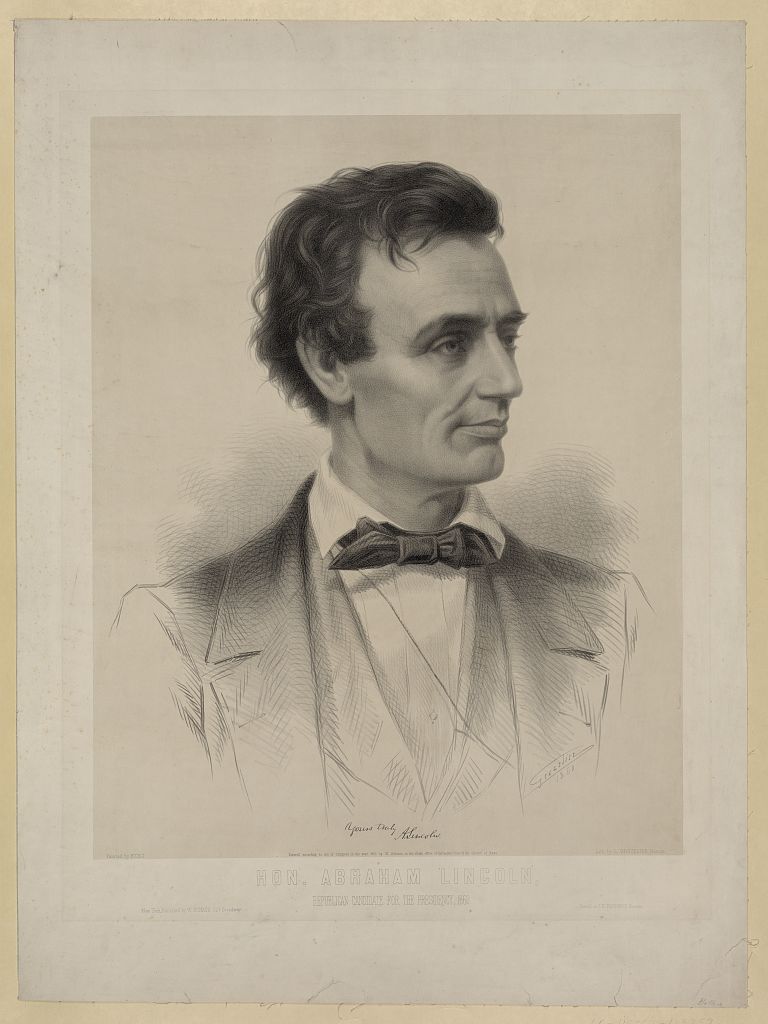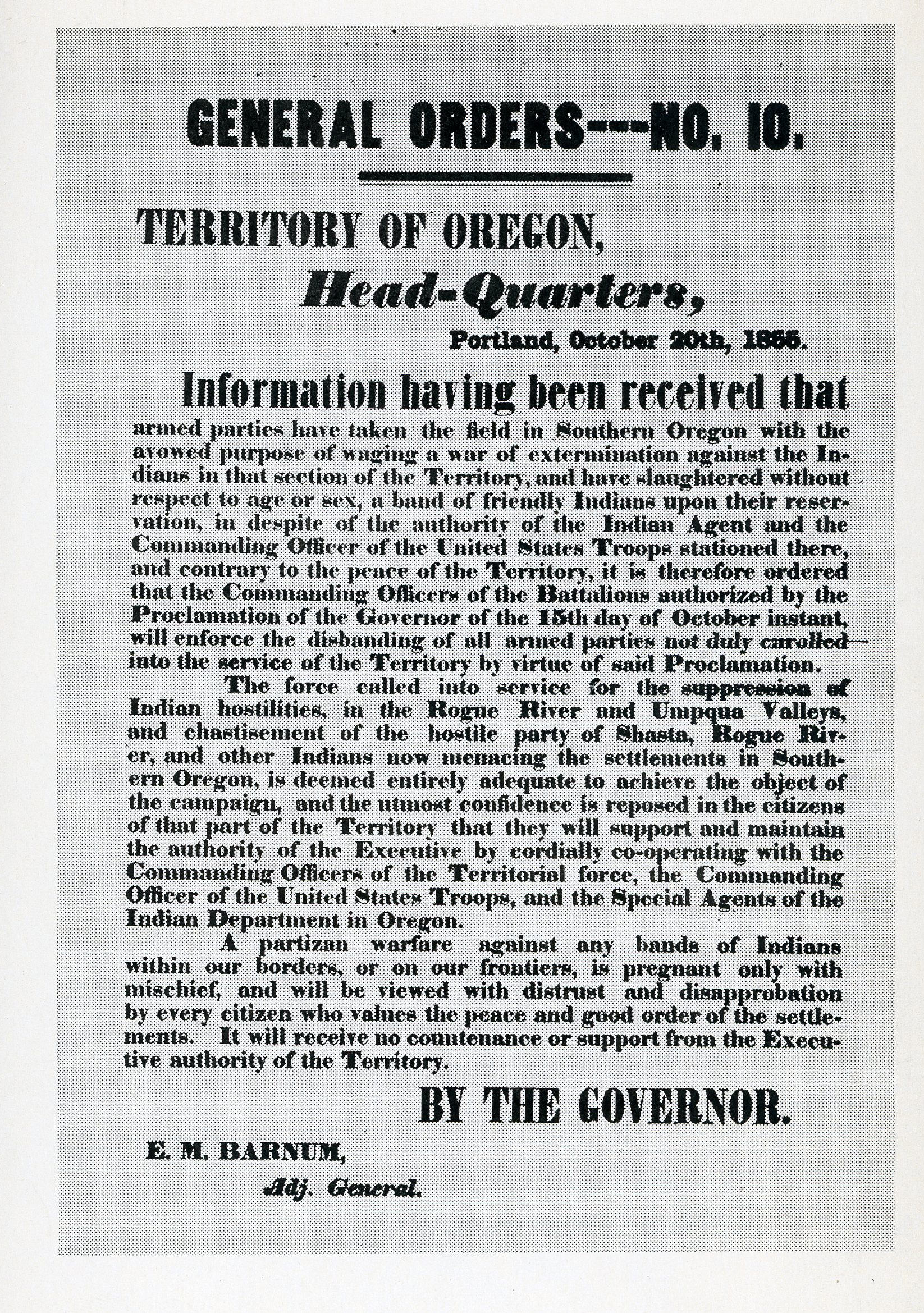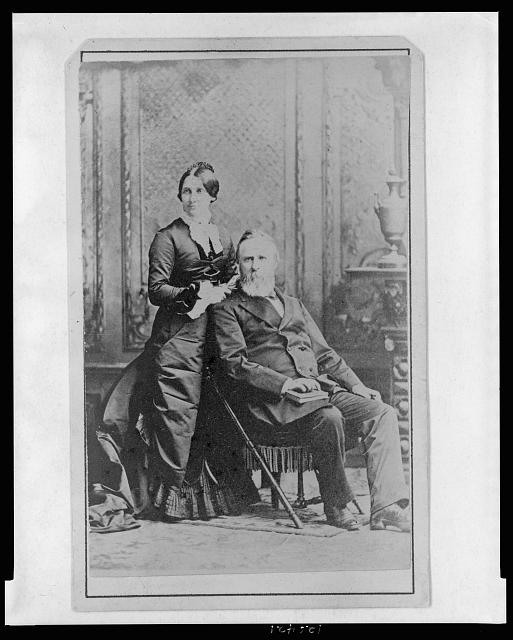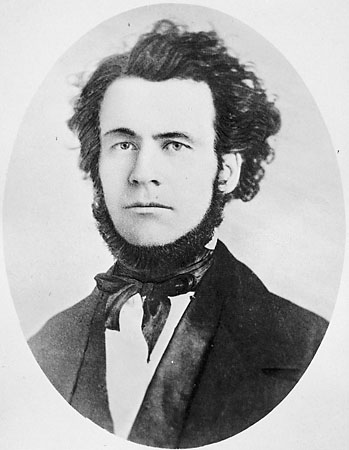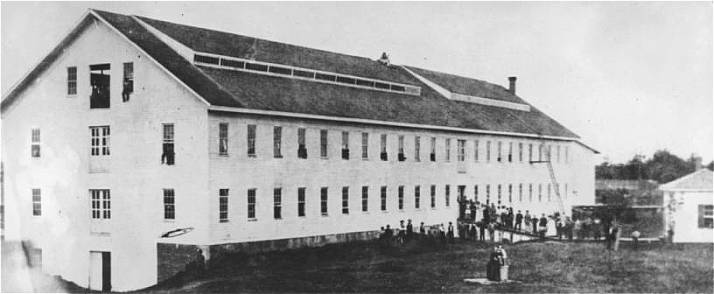LaFayette Grover was politically one of the most successful Democrats in nineteenth-century Oregon and the only politician to win election to the U.S. House of Representatives, the U.S. Senate, and Oregon’s governorship. Elected to the Oregon Territorial legislature in 1853-1856, he served as Speaker of the House in his last session. He also held positions in the territorial judiciary in Oregon and became a wealthy mill owner.
Born in Bethel, Maine, on November 29, 1823, Grover spent two years at Bowdoin College. At age twenty-three he moved to Philadelphia, where he read law and earned acceptance to the Pennsylvania bar. In 1850, he met Oregon’s Territorial Delegate, Samuel Thurston, who invited him to become a partner in his legal business and relocate to Oregon. He accepted and took passage on the Bengal, which arrived in San Francisco in July 1851, where he learned that Thurston had died in April en route to Oregon. That left Grover to find a paying position in Oregon, which he did as an appointed clerk to the Territorial Supreme Court in Salem for six months. He noted in his diary, September 1851: "Think I may be able to do something here in time.” He made friends with other Democrats, notably Oregon Statesman editor Asahel Bush, who asked Grover to stand in for him several times as editor.
Grover was a very partisan Democrat, some styled him ruthless, and he became a member of the Salem Clique, the tight circle of Democrats that dominated politics in Oregon Territory during the 1850s. He joined fellow Clique member Benjamin Harding as a law partner in 1851 and rose quickly in territorial politics as a successful networker. A year later, the legislature selected him as Prosecuting Attorney for the Second Judicial District, which covered southern Oregon, and he became an auditor of territorial expenditures. In 1853, he was appointed Deputy Attorney General for Oregon Territory. “My only amusement is politics," he wrote to a friend in 1854. Grover participated in the 1853 Rogue River War as a leader of volunteer military forces fighting Native people, and after the war he was one of three commissioners chosen to evaluate property claims by resettlers in the valley against the government for material losses.
Grover’s activities branched from politics in 1856 to business enterprise. He was a principal in the Willamette Woolen Mill in Salem and later invested in waterpower on the Santiam River, businesses that increased his wealth over his life. But the center of his influence remained politics. He won election to the territorial legislature for the 1855-1856 session, where he was elected Speaker of the House. The following year, voters sent him to the Constitutional Convention, where he chaired committees on the Bill of Rights and Schedule. In 1858, he was elected as Oregon’s first Congressman, taking office on February 15, 1859, the day after Oregon became a state. But his tenure was brief. In April 1859 at the Democratic state convention in Salem, Grover lost to Lansing Stout for renomination to Congress.
Sectional partisanship had increased nationally after the Dred Scott supreme court decision, and Grover took moderate positions among Democrats, seeking to avoid conflict between the North and the South. He supported Stephen Douglas for president in 1860 and George McClellan in 1864 during the Civil War. After the war, he returned to Oregon electoral politics as Democratic state chairman in 1866-1870, and in 1870 ran for governor against Republican Joel Palmer. Grover won a close contest by avoiding national issues, focusing instead on Chinese immigration to Oregon. The Oregonian editorialized in May 1870 that Grover’s “hammering on this Chinese gong”—the attempt to bar all Chinese from coming to Oregon—was despicable and unconstitutional. During his first legislative session as governor, Grover successfully argued against ratification of the Fifteenth Amendment to the Constitution, which prohibited withholding voting rights “on account of race, color, or previous condition of servitude.” Although the amendment was ratified in February 1870, Grover said during that year’s campaign: “This is a white man’s government, made by white men for white men, and no other race was intended to participate in it.” (Oregon did not ratify the amendment until 1959.) Grover won reelection in 1874.
Grover’s last political foray—his election to the U.S. Senate in September 1876—turned into a national embarrassment. It began with his participation as governor in an attempt to replace one of Oregon’s presidential electors in 1876, which if successful would have given the presidency to Democrat Samuel James Tilden rather than Republican Rutherford B. Hayes. Angry Republicans petitioned to refuse Grover’s seating in the Senate in March 1877. That effort failed, but the Senate held nearly two weeks of hearings in Portland in June to adjudicate charges that Grover had secured his election to the Senate through corrupt bargains of cash or government benefits in exchange for votes in Congress. It made national news. Grover was exonerated in 1878 and served out his term in 1883, but he was relatively powerless in the Senate during his one term.
For the remainder of his life, he returned to his law practice in Portland. His business investments suffered over his last years, leaving him with little wealth. He married Elizabeth Carter in 1865, whose family held considerable property in the Portland Heights neighborhood; they had one child, John Culver Grover, who became a sculptor. Grover’s name is memorialized as Grover Street in Portland’s South Waterfront District. He died on May 10, 1911, from a heart attack and is buried in Riverview Cemetery.
-
![]()
Grover, Hon. LaFayette of Oregon, c.1870.
Courtesy Library of Congress Prints and Photographs, Brady-Handy photograph collection, LC-BH832- 31408 [P&P] -
![]()
LaFayette Grover, Governor of Oregon, 1870-77.
Courtesy Salem Public Library, Oregon Historic Photograph Collections, Statesman Journal Newspaper photo, 372 -
![]()
-
![]()
LaFayette Grover, Oregon's First member of Congress, 1877.
Oregon Historical Society Research Library, 020667
Related Entries
-
![15th Amendment]()
15th Amendment
Civil War Reconstruction arguably culminated with the Fifteenth Amendme…
-
![Asahel Bush (1824-1913)]()
Asahel Bush (1824-1913)
Asahel Bush was a key figure during Oregon's formative years, using the…
-
![Benjamin Franklin Harding (1823–1899)]()
Benjamin Franklin Harding (1823–1899)
Benjamin Franklin Harding helped lead Oregon through the state’s format…
-
![City of Salem]()
City of Salem
Salem, the capital of Oregon, is located at a crossroads of trade and t…
-
![Election of 1860]()
Election of 1860
The presidential election of 1860 was a turning point in Oregon politic…
-
![Rogue River War of 1855-1856]()
Rogue River War of 1855-1856
The final Rogue River War began early on the morning of October 8, 1855…
-
![Rutherford B. Hayes's visit to Oregon, 1880]()
Rutherford B. Hayes's visit to Oregon, 1880
In September and October 1880, Rutherford B. Hayes (1822-1893) became t…
-
![Salem Clique]()
Salem Clique
Thomas Dryer, the first editor of the Oregonian, named the Salem Clique…
-
![Willamette Woolen Mill (Salem)]()
Willamette Woolen Mill (Salem)
The Willamette Woolen Mill (1857-1876) in Salem was among the first woo…
Related Historical Records
Map This on the Oregon History WayFinder
The Oregon History Wayfinder is an interactive map that identifies significant places, people, and events in Oregon history.
Further Reading
Clark, Malcom, Jr, editor. Pharisee Among Philistines: The Diary of Judge Matthew P. Deady, 1871-1892. Portland: Oregon Historical Society, 1975.
"La Fayette Grover Obituary." Portland Oregonian, May 11, 1911.
Heider, Douglas, and David Dietz. Legislative Perspectives: A 150-Year History of the Oregon Legislatures from 1843 to 1993. Portland: Oregon Historical Society Press, 1995.
Johnson, David Alan. Founding the Far West: California, Oregon and Nevada, 1840-1860. Berkeley: University of California Press, 1992.
Mahoney, Barbara S. The Salem Clique: Oregon’s Founding Brothers. Corvallis: Oregon State University Press, 2017.

